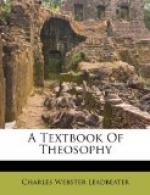These then are the principal factors which determine the next birth of the man. First acts the great law of evolution, and its tendency is to press the man into that position in which he can most easily develop the qualities which he most needs. For the purposes of the general scheme, humanity is divided into great races, called root-races, which rule and occupy the world successively. The great Aryan or Indo-Caucasian race, which at the present moment includes the most advanced of Earth’s inhabitants, is one of these. That which came before it in the order of evolution was the Mongolian race, usually called in Theosophical books Atlantean because the continent from which it ruled the world lay where now roll the waters of the Atlantic ocean. Before that came the Negroid race, some of whose descendants still exist, though by this time much mingled with offshoots of later races. From each of these great root-races there are many offshoots which we call sub-races—such, for example, as the Roman races or the Teutonic; and each of the sub-races in turn divides itself into branch-races, such as the French and the Italians, the English and the Germans.
These arrangements are made in order that for each ego there may be a wide choice of varying conditions and surroundings. Each race is especially adapted to develop within its people one or other of the qualities which are needed in the course of evolution. In every nation there exist an almost infinite number of diverse conditions, riches and poverty, a wide field of opportunities or a total lack of them, facilities for development or conditions under which development is difficult or well-nigh impossible. Amidst all these infinite possibilities the pressure of the law of evolution tends to guide the man to precisely those which best suit his needs at the stage at which he happens to be.
But the action of this law is limited by that other law of which we spoke, the law of cause and effect. The man’s actions in the past may not have been such as to deserve (if we may put it so) the best possible opportunities; he may have set in motion in his past certain forces the inevitable result of which will be to produce limitations; and these limitations may operate to prevent his receiving that best possible of opportunities, and so as the result of his own actions in the past he may have to put up with the second best. So we may say that the action of the law of evolution, which if left to itself would do the very best possible for every man, is restrained by the man’s own previous actions.
An important feature in that limitation—one which may act most powerfully for good or for evil—is the influence of the group of egos with which the man has made definite links in the past—those with whom he has formed strong ties of love or hate, of helping or of injury—those souls whom he must meet again because of connections made with them in days of long ago. His relation with them is a factor which must be taken into consideration before it can be determined where and how he shall be reborn.




